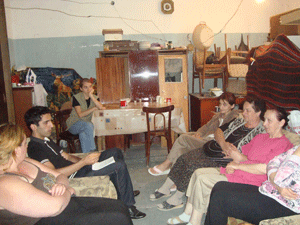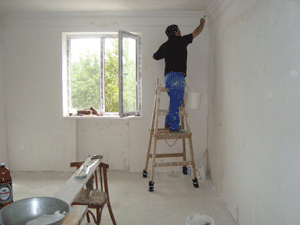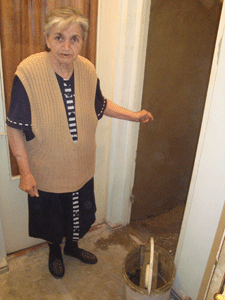Saba Tsitsikashvili, Gori
 People, who were internally displaced from Abkhazia and Tskhinvali regions in 1991-93, think that Government of Georgia pays more attention to the victims of the war in August of 2008. Officials of the Government of Georgia are proud that unlike previous president, the current one has created comfort for new IDPs.
People, who were internally displaced from Abkhazia and Tskhinvali regions in 1991-93, think that Government of Georgia pays more attention to the victims of the war in August of 2008. Officials of the Government of Georgia are proud that unlike previous president, the current one has created comfort for new IDPs.
“We are considered to be IDPs of Shevardnadze (former president of Georgia) and nobody pays attention to us,” said Elena Akhalkatsi, an IDP from Tskhinvali. She shelters in the former building of Students’ Dormitory in Tsmindatskali settlement in Gori. The dormitory once belonged to Gori State University and now it is property of the Ministry of Economic Development.
Old IDPs live in the dormitory. Company “New Energy” is reconstructing the building in accordance to the order of the Municipality Development Fund of Georgia. According to the information on the website of the Fund, “New Energy” is reconstructing the dormitories of Gori district Blood Transfusion Center as well. In total, the New Energy is reconstructing 139 flats in Gori. IDPs live in 87 out of them.
The total cost of the implemented activities is 1,192, 071 GEL. According to the agreement, the reconstruction started on March 23 and was due to finish in August 23. However, the dates do not coincide with real process. The reconstruction started in May and even half of the work has not been done yet.
What Do “New” and “Old IDPs” Mean?
Tamar Kordzaia, lawyer from the Georgian Young Lawyers Association, thinks that similar differentiation appeared after the war in August of 2008.
“The situation demanded rapid action. The issue of new IDPs was too urgent because they remained homeless and providing accommodations for them was priority. However, the different terminology does not contain legal meaning and it was used to describe only factual situation. In legal documents we have not used similar terms and it could not have happened because it contradicts the general principles of the law,” said Tamar Kordzaia.
August – rotten potatoes and spoilt bread
The Human Rights Center visited the former dormitory in Tsmindatskali district in Gori. There is mound of construction ruins on the ground floor of the five-storied building. New window-sills are already installed in the flats but nobody harries to install window glasses in them.
IDPs from Tskhinvali region and Abkhazia live in the building. People from Tskhinvali sheltered in this building during the governance of late president Zviad Gamsakhurdia. Currently, 87 IDP families live in the building. Seven of them are from Abkhazia and the rest are from Tskhinvali. Each of them gets allowance of 22 GEL from the state. Since May 2009 nobody has assisted them.
“Only during the election we received one sack of wheat flour and saltpeter this spring. Nobody pays attention to us. The representatives of the agency for refugees do not know us at all,” IDP from Abkhazia Ala Melaia said.
They recall that during the occupation of Gori the government brought spoilt bread to them. They had put just-baked bread on each other in the van and hot bread spoilt. The IDPs told the people who brought the bread to take the “aid” back. Next time, the IDPs were provided with rotten potatoes. “The aid group organized by Vice-Regional Governor Zurab Chinchilakashvili brought similar presents to us - old IDPs - in August, 2008,” recalled IDPs.
“Since we sent the poor food back to our government, they got angry and have not paid attention to us since then. During the occupation a servant of the church used to bring bread by sledge and if not he, we could die of starvation,” said Dali Mebaghishvili.
After Russians left Gori in August 2008 the life of old IDPs continued in ordinary way. They received allowance of 22 for one person. They have estimated limit on electricity and water supply. New cottages were constructed on a huge field next to their shelter however they watched the cottages only through the windows. Several families from the dormitory received cottages because they internally displaced for the second time.
Old IDPs still live on 22 GEL, limited electricity and water supply. The situation changed for them only in May of 2009.
Forced Rehabilitation...
In May 2009 representatives of the building company visited the shelters of old IDPs and informed them that reconstruction of their flats was due to start. The inhabitants were requested to empty the flats from furniture. The building company promised the IDPs the reconstruction would end within 2 weeks.
Several families started to worry. For example, family of Eliso Chachibaia lived in the room of 9 sq. meters and had nowhere to go. They took their furniture in the corridor or attic and have been living in such conditions for four months already.
Initially, the speed of the reconstruction activities was fine but situation got unbearable two weeks later.
“When IDPs were evicted from the hotel “Iveria” in Tbilisi tracks were sent to them to take furniture. Here we could not take our stuff anywhere. Did we have to take them in the street? We are tired of similar life. Let them finish the reconstruction on time, or let them give the allocated sum to us and we could do the work ourselves,” said Tamar Kasradze. She added that few builders are employed and they have not enough construction materials. She suggested us to arrive at their shelter in the morning in order to witness the argument between inhabitants; they argue about builders. Each family tries to make them work in their flat. The builders follow the family which promises good dinner and money.
“The winter is coming and everybody harries to finish the reconstruction. The workers are few and cannot do the job in time. All old builders quitted work; they even tried to go on strike. Nobody pays money to them. If any of us gives money to them, the builders will work in your house,” said Tamar Kasradze.
Nona Mikia said their family had to finish the launched reconstruction in their flat. “Why did we need similar reconstruction if we had to finish it ourselves? They started the work with the reconstruction of the rooms while initially they had to repair toilet and bathroom,” she said.
A professional builder and an IDP from Tskhinvali who was visiting one of the IDP families in the dormitory interfered in our conversation. The man said during the Soviet Union he worked in the building company and he was surprised at the ongoing reconstruction activities in the dormitory. “I am a bit aware of construction and here I see complete ignorance. Nobody knows what to do; it is horrible,” he said.
Cheap Employment...
We conversed with one of the builders – an IDP from Tskhinvali Giorgi Romelashvili. He also lives in the dormitory and was employed at the construction. Initially, he was paid 200 GEL and was ordered to grind walls.
“They paid 200 GEL in advance. That was all. I mostly grind walls. But there are builders who work from 9:00 am till 6:00 pm. They were promised to pay 20 GEL a day. We were promised to pay 2, 5 GEL for grinding one square meter of the wall; and 6 GEL for fixing one square meter of tiles. We have been working for four months but nobody has paid wages to us yet,” said Giorgi Romelashvil.
We talked with four other builders who said they had started to work in the dormitory four days before. And of course nobody had paid to them yet. The new workers are also IDPs from Abkhazia and they live in the same dormitory. Giorgi Romelashvili said he was paid 200 GEL and had not signed any receipt.
The board of the building company “New Energy” has office next to the dormitory; however when we visited the office there was nobody in it though the working hours had not finished yet.
however when we visited the office there was nobody in it though the working hours had not finished yet.
Having witnessed the unorganized reconstruction activities in the dormitory, IDP Ala Melaia has not allowed the Company to repair her flat. She said she is not ready for it and will not allow anybody to start work in her flat before the winter ends.
Dali Mebaghishvili complains about the windows in her accommodation; she said it would create problems for her family in winter; they would not be able to use stove in the room because of massive window-glasses. The dormitory is not supplied with gas so the only source for heating the flats winter is electricity oven that spends much electricity. The families using electricity ovens pay 100 GEL a month. The estimated limit for each family a month is 100 kilowatts.
Elena Akhalkatsi said she had to purchase construction materials. For example, she bought the door herself and other stuff too; totally she paid 260 GEL and partitioned off the flat herself. Although her store-room on the ground floor is being reconstructed, it might be seized from her. When she fled from Tskhinvali she had two under-age children. One of them has already got married and the second is going to get married now. Consequently, Elena Akhalkatsi hopes she will maintain the store-room on the ground floor and the government would not take it from her.
We met old woman Lili Kasradze on the top floor. Only one room was reconstructed in her two-room flat. She did not allow the workers to start reconstruction in the second room and allowed to change only windows. The workers started to reconstruct toilet in August. The situation is similar in every flat. When the reconstruction started, the sewerage system was closed. In fact, the repair-works did not start in many flats. Since the sewerage system did not work, people living in the dormitory could not use toilets. They requested bio-toilets but nobody satisfied their request.
“The reconstruction activities started early in May but I cannot feel it is going on or not. They have been torturing us. The Company representatives said they were going to reconstruct corridor, rooms and windows; they were to repair the floor too but in fact nothing was done. They started reconstruction of the toilet only today. The workers are paid too little wages and consequently nobody wants to work. We have to add money to the wages to encourage them to work; though they are completely incompetent,” said Lili Kasradze.
Modern Reconstruction and Unequal Spaces
According to the working plan approved by the resolution N 408 of the Government of Georgia issued on May 28, 2009, the accommodations of the IDPs were to be repaired in order to create normal living conditions for them.
Rehabilitation aims to roof the buildings, to improve sanitary conditions and water supply in the buildings; besides that it aimed to supply the accommodations with gas if it was possible. According to the working plan, the process of rehabilitation and criteria development, including minimal criteria, was due to end in May 2009. During the development of criteria the standard applied by the Municipality Development Fund of Georgia shall be taken into consideration; and according to the standard the space of accommodation for each family (3-4 members) shall be 40 sq. meters.
As a rule, each family shall have its own toilet and bathroom but if the space is too small to comply with the standards, one toilet and bathroom can be shared with two or more families.
The working plan aims to offer different variants to IDPs and allows them to make choice (Article 2.1.9 of the Strategy).
“An IDP is offered alternative space or money; the IDP has right to accept more suitable proposal. In short, it depends on the negotiation. The point is that the state shall assume minimal responsibility: - either reconstruct the accommodation or improve his/her living conditions by assigning new accommodation to him/her,” said Tamar Kordzaia, lawyer from the GYLA.
According to the regional department of the Ministry of Refugees and Accommodation, the Municipality Development Fund announced competition on carrying out reconstruction activities in the shelters of IDPs and the work is implemented by winner companies. “After the reconstruction activities finish, the accommodations will be officially registered on IDPs. That means, old IDPs will become owners of their accommodations where they had lived for many years,” said Manana Champuridze, head of the department.
She added that the registration of flats is voluntary. There are families who live in small spaces like 9 sq. meters. In this case, IDPs do not want to have such a little room registered because they will lose allowance after registration.
Majority of IDPs doubts about the honesty of building companies and sincerity of the government. The IDPs preferred to receive the sum allocated on the reconstruction of their accommodations as compensation. They are sure each family deserved the same sum as new IDPs. The suspicion is reinforced by the fact that some old IDPs have larger spaces while others live in small rooms. The rehabilitation work is done in every room equally.
“Yes, they can have the reconstructed accommodations registered but it requires some procedures,” said Tamar Kordzaia. In order to inform the IDPs about the process Kordzaia explained everything in details.
From Reconstruction to Registration...
The shelters, which could be worse for living after reconstruction and were property of the state, were selected for the reconstruction. After selection, the Public Registration Agency started to create correct lists of inhabitants of the shelters. The Public Registration Agency carried out the census of IDPs under the resolution N 4 of the Government of Georgia “About the Program of the Planned Activities according to the State Strategy in regard with Internally Displaced People’; the resolution was issued on January 12, 2009.
In addition to that, the accommodations were to be measures though it did not happen in fact. The IDPs say the board of the building companies visited them unacceptably and demanded to empty the accommodations.
The strategy of the state indicates that wish of IDPs shall be taken in consideration if they are offered to have the space registered. If the flat is registered on the IDP family, the agreement between the IDP and the state shall be signed.
Finally, based on the agreement, the Public Registration Agency will hand the correspondent document to the IDP. The expenses of property registration shall be paid by the state budget.
The strategy provides the abovementioned explanations though it is completely unknown for IDPs. They are in information vacuum. Besides that, it is clear that the process in the dormitory we visited does not comply with the estimated rules.
Tamar Kordzaia said that the IDPs who have small flats “shall demand the space in compliance with the number of family members as it is defined in Article 2.1.6 of the Strategy. IDPs shall provide the Ministry with the information about their space and number of family members; only after that they shall start negotiations.”
“Private Settlements Shall Take Care of Themselves...”
 There are several shelters of IDPs which belong to private persons. For example, so called “Turbaza”, hotel “Kartli,” hotel “Kolkheti” in Gori. The state does not reconstruct these shelters.
There are several shelters of IDPs which belong to private persons. For example, so called “Turbaza”, hotel “Kartli,” hotel “Kolkheti” in Gori. The state does not reconstruct these shelters.
Tamaz Gvimradze, specialist of the Regional Department of the Ministry of Refugees and Accommodation, stated that they started negotiations with the owners of the hotel “Kartli” but they failed to agree; the state wanted to purchase the property.
“The owners of the hotel requested huge sum for the property; they requested 400 USD for one square meter. The state could not afford the sum. So, we refused to purchase it. Consequently, the accommodation of IDPs in the hotel will not reconstructed,” said Tamaz Gvimradze.



